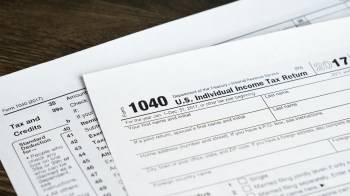Part of the government’s recovery strategy was to incentivize consumers to buy things — a new car, a new house, some more education. The incentives came in the form of tax breaks, and now the bill has come due.
The commissioner of the IRS says says so far, the average income tax refund is up 10% from a year ago to a record $3,036. He says last year’s stimulus package is a major reason. The tax breaks provided by the Recovery Act include:
• A $2,500 American Opportunity Credit for qualified college expenses.
• A tax credit of up to $8,000 for first-time home buyers. Congress expanded this credit in November to provide a $6,500 credit for repeat buyers.
• A deduction for state and local taxes on new vehicle purchases.
• An increase in the Earned Income Tax Credit and the Child Tax Credit.
• A tax break for unemployment benefits. Ordinarily, jobless benefits are taxable, but under the Recovery Act, the first $2,500 in unemployment benefits received in 2009 is tax-free.
While these tax benefits are clearly welcome for those who can take advantage of them, they come at a time when the federal government and the states have huge budget deficits. So, be prepared for the revolving door to swing the other way. Georgia, for one, just beefed up its tax collection manpower:
The (state) House this past week approved one bill that would give a handful of tax agents law enforcement power and another that would make it easier for state officials to garnish the wages of employed residents who owe taxes.
And many states are stepping up their efforts to collect taxes owed by people who live in one state but drive or fly to another state to do work. From the New York Times:
“The states are all hungry for revenue,” said Alan Clavette, an accountant in Newtown, Conn. “We are certainly seeing states like New York and Connecticut looking more and more for executives and everyday taxpayers who may be spending time across the border.”
Once upon a time, state tax officials relied on the sports pages and celebrity magazines to see when well-known higher-earners came to town for work. (Yes, even the taxman reads Us Weekly.) For everyone else, it was largely a “don’t ask, don’t tell” world, says James W. Wetzler, the former tax commissioner for New York State, because it was not cost-effective for states to monitor every bricklayer and lawyer crossing a border…
But now states have greater access to data warehouses that help them better track taxes owed.
These are taxes people technically owe, so that’s one thing. But we haven’t mentioned new taxes that are part of the health care reform or potential taxes, both state and federal, that might be required to close budget deficits. Some of those are a ways down the road. But while the money’s going into many taxpayers’ pockets now, it might not be a bad idea to plan for it coming out in the future.
There’s a lot happening in the world. Through it all, Marketplace is here for you.
You rely on Marketplace to break down the world’s events and tell you how it affects you in a fact-based, approachable way. We rely on your financial support to keep making that possible.
Your donation today powers the independent journalism that you rely on. For just $5/month, you can help sustain Marketplace so we can keep reporting on the things that matter to you.


















